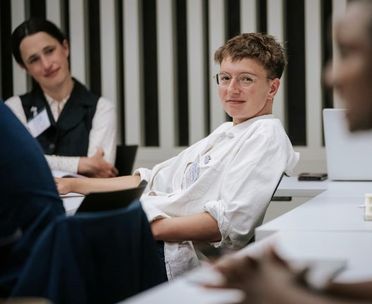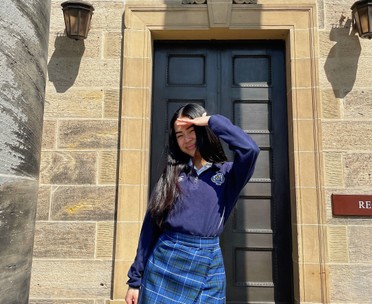

Czechia lacks opportunities to access world education
February 6, 2016
Greetings, dear listeners. My name is Martin Burda and welcome to “Zet Light”. Today’s guest is Czech businesswoman and philanthropist Michaela Bakala. Michaela, welcome to the studio.
Thank you, and hello.
Michaela, you engage in a whole series of entrepreneurial activities. You manage a big part of your family’s Czech activities, and you also oversee the work of the Bakala Foundation. And you are a partner of the TOP ženy Česka (TOP Czech Women) project. So you have a lot on your plate, and yet still manage to raise four children. How do you manage to balance it all?
I manage because I have to, and because I want to. I believe that when I undertake things in life, and have been fortunate enough to do so, that whether it is work or personal, or the places where I studied, I made my life easier by finding those things in which I was interested and undertaking them with relish. I believe that when we take a positive approach to what we do, and when we know why we are doing what we are doing, then we are liberated from a sense of mere obligation, and then everything is made much easier.
Your activities at media house Economia dominate your business activities. You also own a number of stores in Pařížská street. What are your experiences of doing business in the Czech Republic?
My personal experience is not necessarily negative. One likely wouldn’t be doing business here if the end result was doomed to failure. I believe that entrepreneurial activities form a natural component of my life, one which I grew into after setting up my first business. I believe that was in 2003. Then I continued to expand the scope of my activities, and thanks to my family situation today I became a partner of my husband. I enjoy assisting him and I believe that it represents a natural development. So all of this means that I don’t have a sense that one cannot do business in the Czech Republic.
So tell me now – your husband is a very successful businessman. Does he like to have a say in your business affairs and work?
That is (one of the things) I appreciate about him. For one – when we met more than 10 years ago, we were both doing our own things, and I had no interest in his business affairs. We very rarely speak about work-related matters at home. But over the years he also developed a sense of faith and respect in my business abilities, right up to the point that he approached me saying: “Come, I need some help with this. Come, I have faith in you, and I would like to know your opinion.” And I cherish greatly appreciate him, too. Furthermore, those matters which he permitted me to administer or assist with are the ones within the portfolio in which I am naturally most interested anyway. For example, the publisher Economia – I think it is important that this exists in the Czech Republic, and that it is growing, and that we invested in it. We have many new projects, including the prestigious Top ženy Česka (Top Czech Women) poll with which I find myself associated; I follow the media, and also the whole social-political Czech scene, too. As I say: for me this is not just work, it is also entertaining, and continues to afford me the opportunity of learning many new things. I continue to stay in touch with the real, normal world and ordinary people. The same is true of the stores in Pařížská. Add to that the fact that this came about by coincidence; it was one of our investments and it was logical for me to have a greater interest in this than my husband. To take care of retailing matters. “Luxury retail” sounds very nice on paper, but it requires a lot of day-to-day work, as is the case with any retail store. It is one of our investments, which I hope in time will increase in value. But for me the greatest fulfilment today comes from the Bakala Foundation, and that is where I spend the most time. And that is a subject, I believe, we could cover in more depth, because it brings long-term benefits to the Czech Republic.
We’ll get to that very soon, but you also mentioned the Top ženy Česka (Top Czech Women) project. You serve as its patron. Coincidentally, you just announced the list of female winners from across the private and public spheres in January. Please tell us a little more about this project.
The project has existed now for 11 years. I came onboard during last year’s 10thanniversary. And that was thanks to the fact that I was taking an ever increasing interest in the publishing company. And when I noticed that such an interesting poll existed, then I told myself that it merited even greater public awareness and efforts to develop it into the kind of project which it was aiming to be. This meant that last year we engaged in a discussion, together with the expert jury that nominates and selects women for this poll, over its specific nature. There was a consensus that it would be a shame to merely focus on business, and that we also needed to celebrate women who contribute in other ways. For example by their influence, decision-making, artistic capabilities, research, sport, teaching, patronage and philanthropy. We saw it would be a shame to overlook this group and not present it to the public. Because not everyone has to be a businessperson, and not every women needs to become a manager in order to have worth. So we expanded the group of women. And I also told the jury to try to look across the entire Czech Republic, and to not only look within large well-known companies. Because for that I wouldn’t even need a large jury, but rather just a glance across the top 50 list of the largest companies to find a female manager to appraise. I want to point out that this is not how we do things at the publishing company. We create three key criteria, and believe that it should be about the women themselves. The degree of influence they hold; then naturally the performance of the given company; and finally the company’s social contributions and responsibility. That means that women are not excluded merely because their company’s turnover is not one billion Czech crowns, but rather that the women are people who have truly engaged in their own entrepreneurship. On the other hand it is logical that this year it was indeed the female managers of the largest companies who achieved the greatest success [in the poll]. It is true that this means that they possess the greatest influence in Czech society, but I will continue to move the ranking towards not merely being about: ‘If you represent PPF, Agrofert or some other large firm, then you automatically win the award.’ I don’t believe that this is the purpose of the poll; nonetheless it is a very interesting event.
Your philanthropic activities can hardly be considered a hobby – rather they represent a major overlap with your business-related activities. Tell us about the work of the Bakala Foundation, and on which area of charitable work it supports.
Thank you for this question. It emerged quite gradually, but I think that slowly the role is becoming clarified and basically clearer. When my husband and I pondered the question of what our country needs, and in which forms of activity we could engage – in the good sense of the word, because handing out money is not a simple matter – in the first moments ideas for many beautiful and praiseworthy projects came to mind on a daily basis. People whom one could help. But you realise that you can’t help everyone. That is the first thing one must understand. The second thing is that because we have many activities around the world, and do not even live permanently in the Czech Republic, then one must find a team of people in whom one can place their trust. Meaning a team with whom we can realise such an initiative. Thirdly, there is the question of the specific field of endeavour. Before, my husband used to support everything from healthcare, to education, art and architecture. And I don’t think there was a proper sense of focus in that. Seven years ago, we came up with the scholarship programme concept, because we realised that – as I like to put it –education is knowledge. I deliberately say “education” because one’s formal education eventually comes to an end, and that is not enough; rather it is a lifelong process and it is extremely important. And in the Czech Republic we actually still lack sufficient opportunities for people to travel abroad, to not be afraid, to not fear applying for the best schools in the world, whether they are in the UK, US or anywhere else. And it was thanks, in part, to a good education in America that my husband had a chance to succeed, to live the life he is living, to find his profession and a place to earn money. And now he wants to serve as an example and to hand this idea down. And I think that is a good aim. It means that this year we have already supported 100 students; talented Czech students, who are studying at the most prestigious schools in the world, who will then return to the Czech Republic and cooperate with us for those students who are set to follow in their footsteps.
That means that if I am a Czech student and want to study at a prestigious American university, the Bakala Foundation can help me with a scholarship to enable that?
Not just a scholarship, we also support cost of living and travel expenses, if required. Someone could be an excellent student and gain a scholarship, but then their family lacks the funds to support them living abroad, and so they ask for a small contribution to enable the student to live in the US or UK. That means that we are open to both young students, as well as to those who are completing their doctorates or Master’s degrees. And we are unique in that respect. When a student has already gone through our selection process, then there is a [subsequent] evaluation committee, which is comprised of notable individuals from our Czech academic sphere spanning a number of fields. So when this student gains support once, and then properly attains good educational results, and attends school, and stays in contact with us, then we guarantee them that we will remain at their side for the entire period of their studies, and that they do not have to reapply each year. That is really a valuable and reassuring form of assistance in comparison with other such foundations. Furthermore, we have just discovered that we are the largest private foundation in the Czech Republic focused on such matters. The students return to us; and they return the investment via significantly strengthening the potential future of the Czech Republic as a whole. [It is great] to have such quality young people, who are fighting to achieve something, are not fearful, have stamina, and understand that life is about embarking down a long road.
That sounds like quite a prize in the lottery of life. If a Czech student or their parents are listening to us right now wondering what they would have to do to make it into the Bakala Foundation programme... Briefly, could you tell us?
It is very simple. They should go and look at the Bakala Foundation website, and there they will discover that they have time until May of this year to apply for this year’s student selection, which then takes place in September. Usually at the start of September. Each year, around 230-250 people apply. We offer a student HUB, and offer literature, and advisors, who can explain the possibilities, the implications, the requirements of foreign universities, the tests they will have to take, and the timescale of the process, in person to both parents and students. I believe that this is hugely valuable, and that a person can suddenly see that they have managed to make a step forward in life – and that is something I view as very important.
Today’s discussion was with Michaela Bakala, businesswoman and philanthropist. Michaela, thank you so much for accepting our invitation to join us in the studio.
I thank you for providing me with the opportunity to speak about these things.
The interview was aired by BBC Radio Zet


